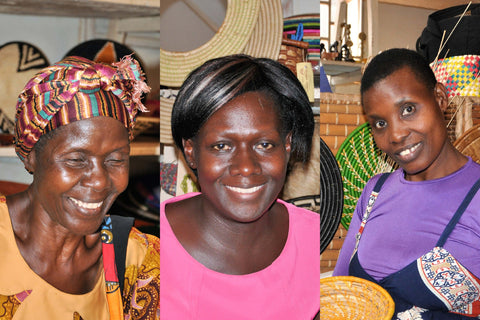meet our artisans
one little world artisans are located all over the world in Brasil, Ecuador, Nepal, Kenya, Rwanda and Uganda, and are near and dear to our hearts. We work closely with each artisan, visiting them regularly to collaborate on product designs (that our customers will love), and just to visit. one little world artisans are paid fairly and upfront for their work and we love and value not only each of them, their families and communities, but the unique and beautiful culture that they each represent.
Mercedes & Alonso; Quinchuqui-Peguche, Ecuador
Alonso and Mercedes create their beautiful wraps on an electric loom that has been passed down to Alonso through three generations of family. Their loom is their way of life! They live with their two daughters, Anahi and Marjury, in Otavalo, Ecuador, a village high in the Andean mountains.
___
Nancy & Carlos; Rancho Chico, Ecuador
Nancy and Carlos hand make their beautiful jewelry using seeds and nuts gathered from the Amazonian region of Ecuador. Acai, pambil and huayruro seeds, along with coconut and tagua nuts, are collected, carved and shaped if necessary, dyed and sun dried. Tiny holes are drilled; and single seeds and nuts are strung together to create stunning, fairly made pieces. Nancy and Carlos live with their four children in Rancho Chico, a small village located high in the Andean Mountains of Ecuador. They were one little world's very first partnership too!
___
Vivana & Christian; Manabi, Ecuador
Christian and Vivana create their gorgeous tagua nut jewelry by hand using nuts collected from the Amazonian region of Ecuador. Their workshop is alive with activity as each step of the process, from sun drying the fruits that contain the nuts, to creating the final product of beautifully unique jewelry, is touched by their hands. Known as the Ivory of South America, tagua nut is unbreakable and simply beautiful…and in its natural color, looks just like ivory! Such a kind and sustainable choice. Christian and Vivana live with their daughter in Manabi Province, off the coast of Ecuador.
___
Maria & Juan Cesar; Quito, Ecuador
Juan Cesar and Maria live outside of the capital city of Quito, Ecuador, in a small home that they share with their nine children. Each set of pine branch crayons is created by hand. Fallen pine branches are gathered, holes are drilled, color is infused, from start to finish, every part of the process is touched by their hands.
___
The Women Artisans of Nepal; Kathmandu, Nepal
___
Kenyan Mamas; Nairobi, Kenya
The Matumaini Children’s Home is a small co-op of 26 mamas located in Nairobi, Kenya. Mamas meet often to clean and dye wool; hand carding the wool to prepare it for the felting process, all to create the unique and adorable African critters you see. Matumaini offers so much more than just a safe working environment for women. Childcare is offered at no expense so that mamas can have their babies close while they work, and when needed, all medical expenses for the both the mamas and their children are covered too! While the majority of women in Kenya live on less than $1 a day, the mamas of Matumaini make at least double that and are paid promptly at the end of every month! The mamas are proud of the work they do, and even more proud that the precious African critters that they create with so much love, reach the hands of customers around the world!
_ _ _
The Women Artisans of Uganda; Kampala, Uganda

Our newest partnership in Uganda, consists of a small group of men and women, marginalized and disadvantaged in society because of physical disabilities, HIV status, being left as orphans or becoming widowed. Artisans work together, sometimes from home, sometimes in the workshop setting, preserving African cultures as they create gorgeous and colorful products made from banana fiber (baskets), paper beads (jewelry), traditional African cloth (fabric earrings and bracelets), and so much more. We are honored and excited to work with our new Ugandan partners.
___







